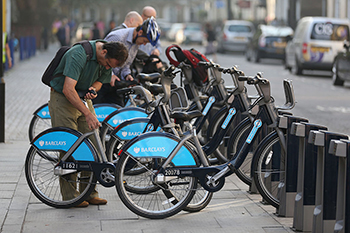(单词翻译:单击)

Three long decades ago Norman Tebbit, a British politician, became in¬famous for saying that in the 1930s his unemployed father got on his bike to look for work.
30年前,英国政治家谭百德(Norman Tebbit)曾说到,30年代,他的父亲在失业后骑上他的自行车找工作,这番言论给他带来恶名,
It was meant to be sensible advice.
尽管他的本意是提供明智建议。
But Onyerbike, as Mr Tebbit came to be known, sparked fury because many unemployed people did not want to move to new areas.
谭百德(后来他被人称为骑上你的自行车)之所以引发人们的愤怒,是因为很多失业者不想搬到新的地方。
Echoes of this are playing out, this time in Virginia.
类似的事情最近发生在佛吉尼亚州,
Hillary Clinton has infuriated coal miners in the Appalachian region by suggesting during her presidential campaign that her environmental policies will put coal miners out of jobs.
希拉里.克林顿(Hillary Clinton)激怒了阿巴拉契亚地区的煤矿工人,因为她在竞选总统期间表示,她的环境政策将让煤矿工人失业。
She then tried to make amends by pledging $30bn to promote measures such as retraining; as the Financial Times reported this week, some miners are becoming software engineers.
她接着试图弥补,承诺拿出300亿美元推动再培训等措施;正如英国《金融时报》本月报道的那样,一些矿工正成为软件工程师。
This sounds reasonable but there is a hitch: Appalachia has few software jobs.
这听上去很合理,但存在一个问题:阿巴拉契亚地区的软件工作岗位很少。
So far, former coal miners seem unwilling to get on their bikes — or even into their pick-up trucks.
迄今,失业的煤矿工人似乎不愿骑上他们的自行车——或者说开着他们的皮卡——搬家。
On one level this seems unsurprising.
从一个层面上来讲,这似乎并不让人意外。
On another, however, it points to a mystery hanging over the American economy and a policy issue that the next president urgently needs to address.
然而,从另一个层面上来讲,它指向萦绕着美国经济的一个谜团,以及下届总统亟需应对的一个政策问题。
The US used to be renowned for having a more flexible and mobile workforce than Europe; in previous centuries millions of people travelled in search of land, riches and jobs.
曾几何时,美国因劳动力比欧洲更灵活和流动性更强而知名;之前的几个世纪,数百万人为了寻找土地、财富和就业而迁徙。
But mobility has declined, not just in Appalachia but everywhere else as well.
但流动性已经下滑,不仅是在阿巴拉契亚地区,在美国其他所有地区也是一样。
In 1990, for example, economists calculated that more than 3 per cent of the workforce moved across state borders each year; that has tumbled to 1.5 per cent.
例如,1990年,经济学家估计,每年有超过3%的劳动者般到另一个州;如今这一比例下降至1.5%。
The decline has affected almost all ages, educational groups and regions.
这种下滑涉及几乎所有年龄段、教育程度和地区的人群。
Indeed, the only highly mobile group are low-skilled Mexican Hispanics: as economists Brian Cadena and Brian Kovak show, Mexican-born immigrants are still moving to find work in big numbers.
的确,唯一流动性较高的群体是低技能的西语裔墨西哥人:正如经济学家布莱恩.卡德纳(Brian Cadena)和布莱恩.科瓦克(Brian Kovak)所指出的那样,大量在墨西哥出生的移民仍在搬家找工作。
White unskilled workers are not.
技能低下的白人劳动者没有这样做。
Why? One theory suggests that, when house prices collapsed in 2008, it left millions of households underwater on their mortgages, making it hard for owners to sell and move.
为什么?一种理论提出,在2008年房价暴跌时,数百万家庭背负的房贷远高于房屋现值,房主很难出售房产和搬家。
But this is unlikely to be the only explanation since mobility was already declining in the decade before the crash of 2008, a period when houses were easy to sell.
但这不太可能是唯一的解释,因为流动性在2008年危机爆发前10年就已出现下滑了,那时房屋很容易出售。
Policymakers would do well to note an intriguing second theory that emerged this week from the research and statistics group at the New York Federal Reserve: this suggests the problem reflects indirect consequences of demographics.
政策制定者最好关注一下最近纽约联邦储备银行(New York Federal Reserve)研究和统计小组提出的另一种耐人寻味的理论:这个问题反映出人口结构的间接后果。
In the past three decades, as Fatih Karahan and Darius Li observe, the proportion of middle-aged workers in the US economy has risen sharply, from 45 per cent to 60 per cent.
正如法提赫.卡拉汉(Fatih Karahan)和达赖厄斯.李(Darius Li)所观察到的,过去30年,美国经济中的中年员工比例大幅上升,从45%升至60%。
Older workers tend to have less desire — or ability — to move.
年纪较大的员工往往更不愿(或者不能)搬家。
The fact of ageing may partly explain the decline in mobility.
老龄化可能在一定程度上解释了流动性放缓。
But Mr Karahan and Mr Li suggest that, when populations age, younger workers also become less willing to move.
但卡拉汉和李认为,当人口老龄化时,较年轻员工也变得不愿搬家。
Between 1990 and 2010, mobility rates for middle-aged workers fell from 2 per cent to 1 per cent; and, for younger workers, from 5.5 per cent to 3 per cent.
1990年至2010年,中年员工的流动比率从2%降至1%,较年轻员工的比例从5.5%降至3%。
While no one knows exactly why this occurs, the NY Fed economists suspect the trend reflects the fact that companies are adapting by becoming more adept at hiring local workers, and Americans are losing the habit of travelling for jobs.
尽管没有人知道其中的确切原因,但纽约联邦储备银行的经济学家怀疑,这种趋势反映出企业正在适应现实,变得更擅长聘用本地员工,美国人正放弃跨州找工作的习惯。
A 10 per cent rise in the share of middle-aged people implies a 30 per cent rise in the share of local hires,
他们总结称:中年人比例上升10%,暗示当地人聘用比例上升30%。
they conclude, arguing that this localisation trend in hiring accounts for 1.2 percentage points of the 1.5 percentage point decline in interstate mobility.
他们辩称,在跨州流动性下滑的1.5个百分点中,招聘本地化趋势占到了1.2个百分点。
This localisation trend might seem counterintuitive as the internet is supposed to have created a hyperconnected world that makes it easier to connect workers with far-flung jobs.
这种本地化趋势似乎是反常的,因为互联网本该缔造出一个超连接的世界,员工更容易从事远距离的工作。
But if the theory is correct — and I suspect it is — it has two big implications.
但如果这种理论是正确的(我猜是这样),它具有两大潜在影响。
First, it helps to explain why so many communities find it hard to adapt to wrenching industrial change and the impact of trade.
首先,它有助于解释为什么这么多社区很难适应工业变革以及贸易影响,觉得痛苦。
Hence the appeal of Donald Trump’s America first sloganeering on the campaign trail.
因此,唐纳德.特朗普(Donald Trump)在总统竞选中提出的美国第一的口号颇受欢迎。
Second, the unwillingness of workers to travel implies that policymakers need to rethink.
其次,员工不愿搬家的现象暗示,政策制定者需要三思。
Instead of offering retraining, the next incumbent in the White House might need to offer big incentives to companies to move.
美国的下任总统可能不需要考虑提供再培训,而是需要为公司搬迁提供巨大激励。
The next president may also need a 21st-century version of the 1862 Homestead Act — which offered land to settlers who went west — and find new ways to encourage workers to relocate.
下任美国总统可能还需要制定一个21世纪版本的1862年《公地放领法》(Homestead Act,该法为那些去西部拓荒的定居者提供土地),并找到新的方法鼓励员工搬迁。
It will not be easy.
这并不容易。
But if mobility keeps falling, the sense of political polarisation and rage in places such as Appalachia will rise.
但如果流动性持续下滑,政治两极分化感和阿巴拉契亚等地区的愤怒情绪将会加剧。
Either way, one thing is clear — whatever happens on November 8 — the wrenching process of industrial change will not go away.
不管怎样,有一点很清楚,不管11月8日的总统大选结果如何,工业变革的痛苦过程不会消失。


